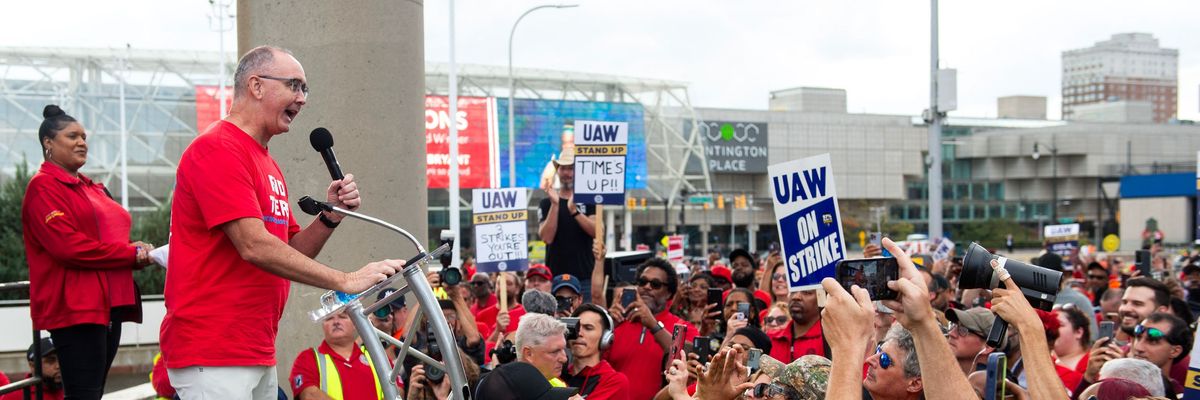The president of the United Auto Workers condemned Ford and General Motors on Saturday after the companies said they plan to temporarily lay off thousands of nonstriking employees, blaming the union's walkouts at two plants in Michigan and Ohio.
Ford said in a statement Friday that it is laying off roughly 600 workers at its Michigan Assembly Plant, pointing to "knock-on effects" from the UAW's walkouts at the facility's final assembly and paint departments.
General Motors, meanwhile, said it expects 2,000 workers at its Fairfax Assembly plant in Kansas "to be idled as soon as next week," a decision the company called "a negative ripple effect" of the UAW's historic strike.
But UAW president Shawn Fain argued the layoffs are completely unnecessary—and an obvious attempt by Ford and General Motors to "put the squeeze on our members to settle for less."
"With their record profits, they don't have to lay off a single employee. In fact, they could double every autoworker's pay, not raise car prices, and still rake in billions of dollars," said Fain. "Their plan won't work. The UAW will make sure any worker laid off in the Big Three's latest attack will not go without an income. We'll organize one day longer than they can, and go the distance to win economic and social justice at the Big Three."
The UAW's response to the layoffs came as union negotiators and the Big Three automakers returned to the bargaining table to continue negotiating over a new contract.
More than 12,000 UAW autoworkers are currently on strike at three plants, and—as part of its "stand-up strike" strategy—the union is expected to call on additional locals to strike in the coming days if the car manufacturers don't make a sufficient contract offer.
The UAW says a gradual wave of strikes at select plants will give its negotiators maximal leverage—and keep the Big Three guessing—as the union attempts to win significant benefit and wage improvements. Fain has said an "all-out" strike is still on the table.
Reutersreported Saturday morning that Stellantis has increased its wage-hike offer to nearly 21% over the life of the contract—the biggest total wage boost proposed by a Big Three automaker thus far, but still well shy of the union's demand for a 36% raise.
Ford and General Motors have proposed raises of 20% and 18%, respectively.
Ford CEO Jim Farley, whose compensation package totaled nearly $21 million last year, faced backlash from the UAW and lawmakers for claiming earlier this week that the union's wage demands would "bankrupt" the company.
"There's no way you can continue wasting hundreds of millions of dollars on stock buybacks to manipulate prices, jack up CEO pay to ludicrous levels, all while starving the workers who actually make the product you sell," Rep. Alexandria Ocasio-Cortez (D-N.Y.) replied on social media. "THAT is what is unsustainable. Pay your workers."
Fain, for his part, called Farley's claim "a lie like everything else that comes out of their mouths."
As Fortunereported on Friday, Morgan Stanley's auto analyst estimated in a recent note that a 40% pay raise for autoworkers would result in $2.6 billion in additional labor costs for Ford, which expects to bring in $168 billion in total revenue this year.
The company spent nearly $500 million on stock buybacks last year.
"They could double our wages and not raise the prices of vehicles, and they would still make billions of dollars," Fain said from the picket line on Friday.

